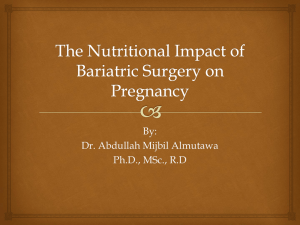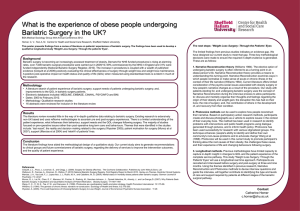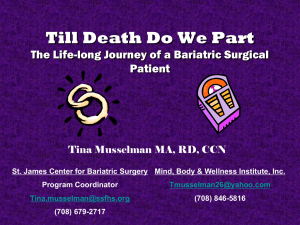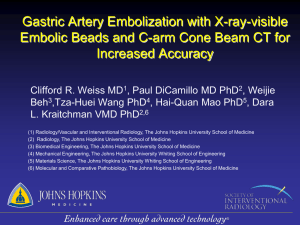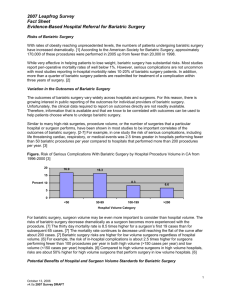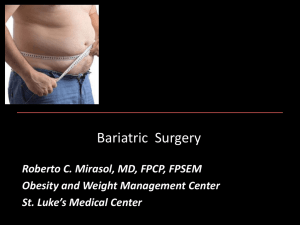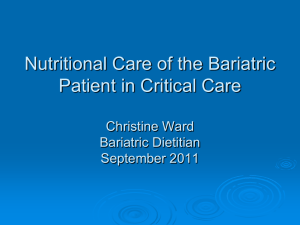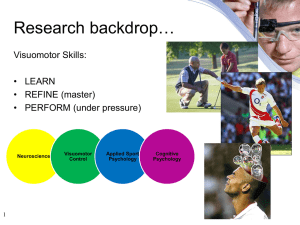slides3 - Society Of Interventional Radiology
advertisement
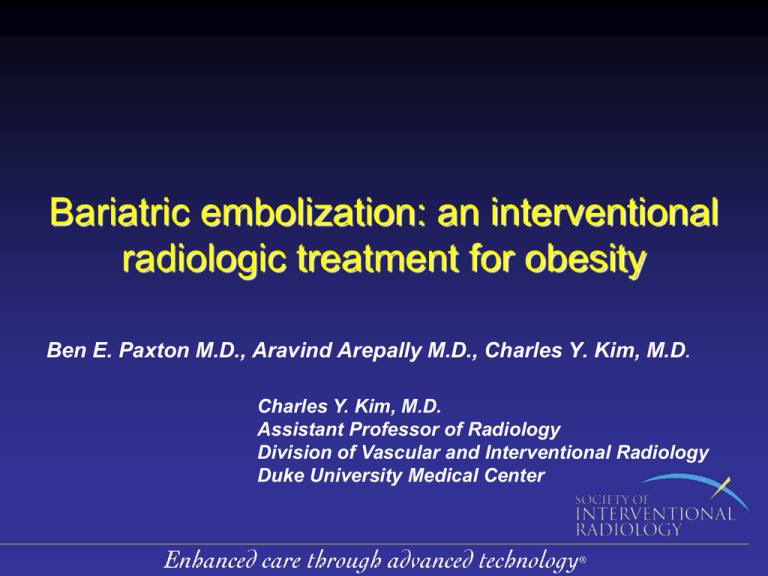
Bariatric embolization: an interventional radiologic treatment for obesity Ben E. Paxton M.D., Aravind Arepally M.D., Charles Y. Kim, M.D. Charles Y. Kim, M.D. Assistant Professor of Radiology Division of Vascular and Interventional Radiology Duke University Medical Center Obesity • An epidemic? • 2008: 1.5 billion overweight; 500 million obese • Major risk factor for diabetes, heart attacks, stroke, cancer, osteoarthritis – Increases risk of diabetes 18-fold • Fifth leading risk for death globally • Ex. 25 yr old morbidly obese loses 12 yrs Buchwald H et al. JAMA 2004 Olshansky SJ. New England Journal of Medicine 2005. What can be done? • Diet / exercise – Difficult to sustain • Medications – Average wt loss: 6-10lbs • Surgery… Aronne LJ et al. Am J Med 2009 Bariatric surgery Bariatric surgery: the good • • • • • • Average weight loss: 88 lbs (sustained) Diabetes: 77% resolved Hypertension: 62% resolved Sleep apnea: 86% Hypercholesterolemia: 87% improved Effects of obesity… Buchwald H et al. JAMA 2004. Bariatric surgery: the bad • • • • • Major Abdominal Surgery Mortality: 1-2% Wound complications: 7% Hernias: 9% Esp high risk: – Extreme obesity – Co-existing medical conditions • Need an alternative for surgery! DeMaria EJ. New England Journal of Medicine 2007. Crookes PF. Ann Rev Med 2006. What is embolization? • “embolization” : obstruction of a blood vessel • Common tool for interventional radiologists – Stop life-threatening hemorrhage – Treat tumors • Performed through a ‘needle hole’ in the body What is Ghrelin • The “Hunger” hormone – THE most potent appetite stimulant • 90% produced in the stomach fundus • Levels rise before meals • Levels fall after eating • Levels increase with dieting • *Ghrelin is a key target for weight control “Bariatric embolization” • Pioneered by Aravind Arepally MD, interventional radiologist • Concept: Interventional radiologists can destroy cells by blocking the blood supply • Most ghrelin secreting cells in the fundus • Interventional radiologists are experts at finding and targeting specific arteries * can we destroy ghrelin-secreting cells by blocking its blood supply? Fundus Experimental study: Bariatric Embolization • Duke University Medical Center • Ben Paxton MD, Aravind Arepally MD, Charles Kim MD • Funded by resident grants to Dr. Paxton – S.I.R, R.S.N.A. • 12 pigs – 6: bariatric embolization – 6: untreated Ghrelin levels after bariatric embolization (relative to untreated animals) 500 250 Difference 0 in Ghrelin levels -250 Week 4 Week 7 untreated -500 -750 -1000 -1250 -1500 Bariatric embolization Weight change after bariatric embolization (relative to untreated animals) 6% % wt gain 4% 2% Week 4 0% % wt loss Week 7 untreated -2% -4% -6% -8% -10% -12% Bariatric embolization Endoscopy and stomach analysis • • • • *No evidence of tissue death No perforations (holes) Ulcers in 2/6 Drastically decreased numbers of ghrelin-producing cells Nontreated Bariatric embolization Conclusions • *Starving the stomach of its blood supply decreases ghrelin, which decreases hunger • *Performed through a needle hole • *No evidence of dangerous stomach destruction • FDA cleared devices • Ulcers in 33% of treated need to refine technique / adjunct medications • Nearing clinical trials in humans – Potential adjunct or alternative to surgery?

